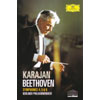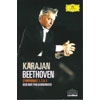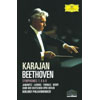Beethoven Symphonies Nos 4 - 6
There’s only one star here and it’s not Beethoven
View record and artist detailsRecord and Artist Details
Composer or Director: Ludwig van Beethoven
Genre:
DVD
Label: Deutsche Grammophon
Magazine Review Date: 5/2006
Media Format: Digital Versatile Disc
Media Runtime: 100
Mastering:
Stereo
Catalogue Number: 073 4102GH

Tracks:
| Composition | Artist Credit |
|---|---|
| Symphony No. 4 |
Ludwig van Beethoven, Composer
Berlin Philharmonic Orchestra Herbert von Karajan, Conductor Ludwig van Beethoven, Composer |
| Symphony No. 5 |
Ludwig van Beethoven, Composer
Berlin Philharmonic Orchestra Herbert von Karajan, Conductor Ludwig van Beethoven, Composer |
| Symphony No. 6, 'Pastoral' |
Ludwig van Beethoven, Composer
Berlin Philharmonic Orchestra Herbert von Karajan, Conductor Ludwig van Beethoven, Composer |
Composer or Director: Ludwig van Beethoven
Genre:
DVD
Label: Deutsche Grammophon
Magazine Review Date: 5/2006
Media Format: Digital Versatile Disc
Media Runtime: 104
Mastering:
Stereo
Catalogue Number: 073 4101GH

Tracks:
| Composition | Artist Credit |
|---|---|
| Symphony No. 1 |
Ludwig van Beethoven, Composer
Berlin Philharmonic Orchestra Herbert von Karajan, Conductor Ludwig van Beethoven, Composer |
| Symphony No. 2 |
Ludwig van Beethoven, Composer
Berlin Philharmonic Orchestra Herbert von Karajan, Conductor Ludwig van Beethoven, Composer |
| Symphony No. 3, 'Eroica' |
Ludwig van Beethoven, Composer
Berlin Philharmonic Orchestra Herbert von Karajan, Conductor Ludwig van Beethoven, Composer |
Composer or Director: Ludwig van Beethoven
Genre:
DVD
Label: Deutsche Grammophon
Magazine Review Date: 5/2006
Media Format: Digital Versatile Disc
Media Runtime: 124
Mastering:
Stereo
Catalogue Number: 073 4103GH

Tracks:
| Composition | Artist Credit |
|---|---|
| Symphony No. 7 |
Ludwig van Beethoven, Composer
Berlin Philharmonic Orchestra Herbert von Karajan, Conductor Ludwig van Beethoven, Composer |
| Symphony No. 8 |
Ludwig van Beethoven, Composer
Berlin Philharmonic Orchestra Herbert von Karajan, Conductor Ludwig van Beethoven, Composer |
| Symphony No. 9, 'Choral' |
Ludwig van Beethoven, Composer
Berlin Opera Chorus Berlin Philharmonic Orchestra Christa Ludwig, Mezzo soprano Gundula Janowitz, Soprano Herbert von Karajan, Conductor Jess Thomas, Tenor Ludwig van Beethoven, Composer Walter Berry, Bass-baritone |
Author: Peter Quantrill
A change of tack for the Eroica and the Seventh gets dramatic results. In a neat semantic reverse, Niebeling places the orchestra on a precipitous model of a Greek theatre, with Karajan literally centre stage on his own podium. Whatever the musicians thought about this order, they play like gods. The camera circles Karajan as he carves paragraphs in the air, eyes shut but inwardly focused on the überlinien. Transitions are especially masterful; you are only aware of the tempo change in the first movement of No 7 in retrospect, because their relationship is so subtle and so natural. To nail the comparison, the finale winds up to a pitch of intensity and constant eventfulness that Furtwängler would be forced to admire.
Turning to Abbado’s DVD cycle after this is like plunging your head in a bucket of iced water. After the initial shock, a heightened level of detail is welcome; but something more vital has been lost, the melos, the nowness of a whole movement, even a whole symphony, that prevents it from fragmenting into a series of gestures. The intimacy of Abbado’s Allegretto is fit for a side-chapel; with Karajan we are in the nave, mourning a king.
An air of Icarean hubris also hangs over the other studio films. Unless you turn off the screen, it is difficult to take your eyes off Karajan; only afterwards does the absence of good humour seem a serious shortcoming, in Nos 1 and 2 at least.
Among the Philharmonie performances, the Ninth asks too much of my willing suspension of disbelief. It was recorded ‘around’ concerts at New Year 1968, but in place of an audience is a grey backdrop with concert-goers painted on (except for a bizarre hiatus at the beginning of the Turkish march, where video footage from a concert has been pasted in). The reading is more similar to Karajan’s celebrated 1962 recording than any other, but its heavy, emphatic rhetoric becomes progressively less and less convincing: I don’t remember hearing or seeing so joyless a finale.
The Fourth and Fifth are genuinely live and all the better for it, with final chords (and therefore everything that leads to them) that carry the expectation of applause rather than the click of the studio light. As in the Seventh, the Berliners’ ‘high’ A ratchets up tension, their tonal palette a saturated impasto to the glowing transparency of the Concertgebouw with Carlos Kleiber. At similar tempi Kleiber finds more disruptive forces in the slow movement and finale of the Fourth, but Karajan has his own way of dispelling Tovey’s fanciful ‘Grecian urn’ imagery. The Fifth’s Trio is identical in tempo and articulation to a 1958 Berlin concert, yet the 1972 performance brings a far stronger sense of continuity which would become more assured still, even to a concert in December 1988, four months before Karajan’s death. This later performance also lays to rest the charges laid by Neville Cardus concerning the self-consiousness of Karajan’s dynamic transitions; the finale on this DVD could deafen a listener who has made sure of hearing the end of the Scherzo.
Karajan’s later Télémondial DVD cycle (which has appeared on Sony) is more of a piece both to watch and to listen to – not necessarily to its benefit. For now, sceptics should try the middle volume first.
Discover the world's largest classical music catalogue with Presto Music.

Gramophone Digital Club
- Digital Edition
- Digital Archive
- Reviews Database
- Full website access
From £8.75 / month
Subscribe
Gramophone Full Club
- Print Edition
- Digital Edition
- Digital Archive
- Reviews Database
- Full website access
From £11.00 / month
Subscribe
If you are a library, university or other organisation that would be interested in an institutional subscription to Gramophone please click here for further information.




